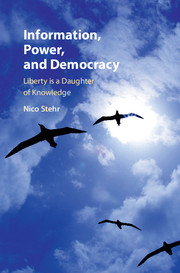Book contents
Excursus: How much knowledge does democracy need, and how expensive should it be?
Published online by Cambridge University Press: 05 December 2015
Summary
The democratic citizen is expected to be well informed about political affairs. He is supposed to know what the issues are, what their history is, what the relevant facts are, what alternatives are proposed, what the party stands for, what the likely consequences are (emphasis added).
Berelson, Lazarsfeld, and McPhee (1954:308)By the demanding standards Bernard Berelson and his colleagues formulated in their classic study of the formation of voter opinion, most voters in most countries, not only in the decade of the 1950s but also today, fall short of their stringent expectations. But the commonsense view of the kinds of intellectual qualities democratic citizens should have, as well as the preeminent opinion among professional observers in particular, is often that citizens in democratic societies should be knowledgeable and well informed. This applies with particular force to political information or knowledge. Political information is the key currency or code that governs democratic politics and citizenship (e.g., Lakoff, 1971:12; Delli Carpini and Keeter, 1996:8). Information, ideally objective information, is the source of political preferences. The idea that resilient democracies depend on informed citizens is by no means a new insight; nor is the expectation that the state and the political system have to shoulder the responsibility for providing the foundations for adequate citizenship.
Not only the founding fathers of the American democracy, but also the classical observer of the American revolution, Alexis de Tocqueville (e.g. [1835–40] 2000:291), offer extensive observations regarding the question “how much knowledge do citizens require, and what knowledge do they need?” as well as “can adequate knowledge guarantee the persistence of democratic regimes?” During this period in history, at the dawn of mass democracies, the response to the latter question was mostly in the affirmative. Thomas Jefferson, for example, is explicit in his expectation and demand: In a letter to Colonel Edward Carrington (Koch and Peden, 1944:411–412) written on January 17, 1787, he emphasizes:
The basis of our government being the opinion of the people, the very first object should be to keep that right; and were it left to me to decide whether we should have a government without newspapers or newspapers without a government, I should not hesitate a moment to prefer the latter. But I should mean that every man should receive those papers and be capable of reading them (my emphasis).
- Type
- Chapter
- Information
- Information, Power, and DemocracyLiberty is a Daughter of Knowledge, pp. 76 - 81Publisher: Cambridge University PressPrint publication year: 2015



